[vc_row][vc_column][vc_single_image image=”949″ img_size=”full” alignment=”center”][vc_custom_heading text=”“A Piece of My Mind”” font_container=”tag:h1|font_size:50px|text_align:center|color:%232633ef” google_fonts=”font_family:Bitter%3Aregular%2Citalic%2C700|font_style:700%20bold%20regular%3A700%3Anormal”][vc_custom_heading text=”December 2019 Newsletter” font_container=”tag:h1|font_size:30px|text_align:center|color:%232633ef” google_fonts=”font_family:Bitter%3Aregular%2Citalic%2C700|font_style:400%20regular%3A400%3Anormal”][/vc_column][/vc_row][vc_row][vc_column width=”2/3″][vc_column_text]
Advancing Christian Faith and Values,
Defending Religious Liberty for All,
Supporting Civility and the Common Good
through Preaching, Teaching, Writing, Activism and Reasoned Conversations
www.donaldshoemakerministries.com[/vc_column_text][/vc_column][vc_column width=”1/3″][vc_single_image image=”1304″ img_size=”full” alignment=”center”][/vc_column][/vc_row][vc_row][vc_column][vc_column_text]
“3 R’s” for Churches at the Start of Every New Year
 Revival – is our church aflame with (wise) zeal and love and enthusiasm to serve the Lord, along with repentance from sin and forgiving others?
Revival – is our church aflame with (wise) zeal and love and enthusiasm to serve the Lord, along with repentance from sin and forgiving others?
Reformation – Are our doctrines and values thoroughly biblical and their explanations crisp and clear and contemporary?
Renewal – Are our church’s structures (including facilities and grounds and equipment) positive testimonies and enhancements to our witness and are our methods and governance as sharp as they could be? Read pages 3-6 below about one key area of “Renewal” your church may need.[/vc_column_text][/vc_column][/vc_row][vc_row][vc_column][vc_column_text]
Bible Insight – The Christmas Immigration Story
A Fitting Word for Epiphany Sunday, January 5, 2020
“…an angel of the Lord appeared to Joseph in a dream. ‘Get up,’ he said, ‘take the child [Jesus] and his mother and escape to Egypt. Stay there until I tell you, for Herod is going to search for the child to kill him.’” – Matthew 2:13
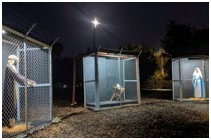 A church in Claremont, California created quite a controversy (as I’m sure they intended) by putting Joseph, Mary, and Baby Jesus in cages—symbolizing experiences of some attempting immigration into the U.S. along the southern border.
A church in Claremont, California created quite a controversy (as I’m sure they intended) by putting Joseph, Mary, and Baby Jesus in cages—symbolizing experiences of some attempting immigration into the U.S. along the southern border.
My opinion? No depictions of the plight of immigrants can be better than the simple biblical story of the danger facing the Holy Family at the hand of the paranoid and murderous King Herod. By God’s guidance Joseph and Mary fled with Jesus to Egypt. That didn’t end the danger! After Herod’s death the family returned to the land of Israel, again by God’s guidance, and finally settled safely in Galilee (read Matthew 2:19-23).
 Here was government oppression to faith in God, up to and including killing. Here was fear to return to the land because of new oppression. Imagine being afraid of the leaders in the country you love and call “home”, because they cannot tolerate a challenge to their rule—in this case a spiritual challenger (this is typical of tyranny). The travail and risks of emigration are preferred over the travail and risks of living under tyranny while striving to please God.
Here was government oppression to faith in God, up to and including killing. Here was fear to return to the land because of new oppression. Imagine being afraid of the leaders in the country you love and call “home”, because they cannot tolerate a challenge to their rule—in this case a spiritual challenger (this is typical of tyranny). The travail and risks of emigration are preferred over the travail and risks of living under tyranny while striving to please God.
Christians believe the flight to Egypt by Jesus’ family had special redemptive significance, for this child was destined to rule and abolish evil rulers like Herod personified (listen to the words of “Joy to the World”).
But the stories about Jesus provide broader value as they point us to the vision of the prophets for a land of justice and mercy. For that I pray, and I give thanks for the social impact of the Christmas Season. Jesus is indeed the savior of those who believe, but also the savior of all people everywhere (1 Timothy 4:10), including those living under and fleeing from oppression.
See Appendix for my denomination’s 2019 resolution on immigration.[/vc_column_text][/vc_column][/vc_row][vc_row][vc_column][vc_column_text]
Pastoral Compensation—Proper and God-pleasing
By Donald Shoemaker
Pastor Emeritus of Grace Community Church of Seal Beach, CA
“The elders who direct the affairs of the church well are worthy of double honor, especially those whose work is preaching and teaching. For Scripture says, ’Do not muzzle an ox while it is treading out the grain,’ and ‘The worker deserves his wages.’” – 1 Timothy 5:17-18 (NIV)
Neither then nor today have most Christian leaders received financial compensation for their service. But many others are “career pastors” or have other compensated roles in the local church. A given church has hired them with the expectation that such “career” people are what the church needs and they should be compensated for their services.
What financial obligations do we have to our pastors? And do we approach these obligations with joy or with reluctance?
Before getting deeper into that topic, I want to stress how important it is for churches to demonstrate leadership in good and honorable ways. Churches should be the engines of healthy change, not the cabooses (have you ever seen a caboose—once the last car on a freight train?). Accommodations for those with disabilities? Churches should already lead the way and not wait for a city agency to come along and tell them what they must do. The same is true with pastoral compensation and other matters of pastoral care. Lead the way!
Here are my convictions1 (they are intended to fit full-time pastoral roles and would need adjustments to fit other compensated roles in the church).
1. Compensation
Compensation should be commensurate with a pastor’s training, years of experience and level of achievement. As compared to what? Certainly as compared to similar pastoral positions in the area.2 But also to similar secular positions, such as education. Why shouldn’t the senior pastor earn what a principal earns at a local school of similar size?
Compensation should never include the costs of doing ministry. Not only is this wrong in itself, but it gives the impression the pastor is earning more than he really earns.
Compensation should also include reimbursement of one-half of Self-Employment Tax (“Social Security”).3 A pastor is considered self-employed by the IRS for Social Security purposes. The tax is currently 15.3%. If the pastor were considered an employee, the church would have to pay half of that. This is a matter of equity.
The Bible gives the principle of compensating someone as he is “worthy.” So let’s ask, does our compensation package express what the pastor is truly “worth”?
2. “Fringe” Benefits
• Health, dental and vision insurance paid totally or in part by the church (here’s an idea if this is something new: start 50/50 and move up to 90% paid by the church). Remember that this fringe benefit saves the pastor a significant amount of tax, as it also does for workers in secular jobs.
• Vacation time of two to four weeks, four being appropriate for the senior pastor.
• Identified holiday time off, or “CTO” if the pastor must work on a holiday. The church I served thoughtfully added the Monday after Easter to the list, which now totals twelve days.
• Sick pay of 10 days per year that can be accumulated up to a reasonable limit.
• Bereavement pay.
• Maternity and paternity leave (this can be covered by sick pay or vacation pay) for up to six months.
• Term life insurance of $50,000.
• A defined-contribution retirement program. The church should match the pastor’s pre-tax contribution up to 5%, perhaps phasing this in over the first three years of service.
3. Professional Expenses (“Who serves as a soldier at his own expense?”
– 1 Corinthians 9:7)
• The church should cover all reasonable costs of doing ministry. This includes professional library and computer-related tools, expenses for conferences, ministerial dues, periodicals, a mobile phone, and more.
• An accountable “Petty Cash” system is a wise way to cover smaller expenses, like lunch with a prospect or a book or the cost of attending a meeting.
• Reimbursement of mileage for the work-related use of the pastor’s vehicle (this must be the per-mile rate established by the IRS and cannot include commuting).
• All professional expenses should be supported in writing to be honorable and to avoid taxes. Avoid any taxable schemes like “$200 a month for auto”.
4. Professional Improvement
• A paid Sabbatical of three to six months every seventh year of service to provide for concentrated professional growth and improvement.4
• Cost of continuing education.
5. Community Service
• Encourage the pastor to be involved in meaningful community service and cover any expenses involved (such as membership fees for community organizations).
• Provide 10 days of compensation for Jury Duty. Some pastoral work can be accomplished during Jury Duty, but be sure the pastor isn’t expected to perform two jobs during this period.
6. Debt Retirement
• If the pastor is paying off a student loan for seminary or other ministry-related graduate studies, the church should view itself as the beneficiary of this training and pay the monthly expense of this debt.
All of this is to fairly compensate the pastor who is serving honorably and well. The church has to set its own measurement standards to evaluate this. Job descriptions are essential for holding a pastor accountable to agreed-upon performance points. They also protect a pastor from unestablished expectations.
I have talked about financial and related responsibilities a church has toward its pastor. There are other responsibilities. Protecting church leaders against unfair criticism, a process for handling grievances, clear job expectations, striving for a spirit of “shalom” in the church, and protecting the pastor’s family from unnecessary intrusions and criticisms are among them.
None said it better than the Apostle Paul: “Respect those who work hard among you, who are over you in the Lord and who admonish you. Hold them in the highest regard in love because of their work. Live in peace with each other.”
– 1 Thessalonians 5:12-13
ENDNOTES:
(Introduction) Several of my points follow generally the compensation policies set forth in the employee handbook of Grace Community Church of Seal Beach, where I served as senior pastor from 1984 to 2012.
2 (Compensation) One compensation study I read covered such a broad geographical area as to be almost meaningless (what hath Arizona to do with Orange County, California?). It also gave no consideration to the pastor’s education.
3 (Compensation) The church should require its pastors to be in the Social Security program. They cannot “opt out” because (1) chances are strong they will not provide for comparable retirement income on their own, and (2) more important, pastors (and their denominations) do not have the required moral objections to government programs like Social Security.
4 (Professional Improvement) Some churches never think of a sabbatical (or a retirement plan, for that matter) since they don’t expect a pastor to stay long and they treat him accordingly. Taking unfair advantage of a pastor is a clear violation of scripture (1 Timothy 5:17-18).[/vc_column_text][/vc_column][/vc_row][vc_row][vc_column][vc_column_text]
Tribute to a Good Friend and Community Leader
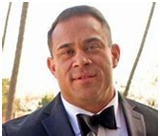 Seth Eaker, 46, of Seal Beach CA died suddenly and unexpectedly on December 18.
Seth Eaker, 46, of Seal Beach CA died suddenly and unexpectedly on December 18.
He was a respected Seal Beach community leader, involved with the Lion’s Club, the Police Foundation, the Chamber of Commerce and just about anything else that was significant in town. He was a long-time spokesman on LGBT issues.
Seth and I had our points of agreement and respectful disagreement. We would exchange long emails, walk on the pier, stroll the streets of Old Town or just sit and talk. He would thoroughly prepare for our discussions and I quickly learned I had to be “on my toes” as well. We would discuss the Bible, religion, ethics, religious liberty and gay rights, court decisions, politics, community issues, and more. We were both listeners. I was honored whenever he would refer to me as his “mentor.”
When he was nominated to be Seal Beach’s Citizen of the Year in 2014, I voted for him as a member of the selection committee. We last sat together at the Chamber of Commerce breakfast November 14.
I will miss all my personal encounters with my good friend. The community will miss his energetic, loyal presence and service and his ability to add worth to anyone he encountered.
[/vc_column_text][/vc_column][/vc_row][vc_row][vc_column][vc_column_text]
Issues of Death and Dying
(NOTE: I spoke on “Death and Dying” to a group of ministers on November 12. Five days later death hit very close to home when my wife’s brother passed away. Suddenly the topic became immensely personal. I hope the words I share will be of value to both pastors and others.)
“There is a time for everything…A time to be born and a time to die…”
“[God] has made everything beautiful in its time.” – Ecclesiastes 3:1, 2, 11
If October 31 is “Dia de los Muertos” (“Day of the Dead”) then September through December have truly been “cuatro meses de los muertos” (“four months of the dead”) for my family and myself.
September, October, November, December – eight deaths plus serious illness!
• “Aunt Sally” called from Ohio in August to say she was dying of kidney failure. “Would you prepare a memorial message that could be played at the service?” “Of course we will—and we will visit you when we are in Ohio in October.” Three weeks later we received a call that Aunt Sally had died. We “Skyped” a memorial service to those gathered at a funeral home in Ohio.
• Jarrid Wilson, well-known pastor serving with Greg Laurie at Harvest Church in Riverside, CA, and minister on suicide issues and close friend to our daughter and her family, committed suicide in September.
• We travelled to Ohio in October to visit my brother and my wife’s brother, both of whom were having major health issues.
• Two church members passed—Trudy in her sleep, Chris after being briefly ill with cancer.
• Well-known worship pastor Keith Wells died of pancreatic cancer a few weeks after experiencing severe pain during a worship service—his “retirement” service.
• As I prepared to leave home for Trudy’s memorial, our next-door neighbor suddenly died. This experience showed the truth of Proverbs 27:10 – “Better a neighbor nearby than a relative far away.”
• My wife’s brother died under hospice care in Ohio on November 17.
• Seal Beach community leader and good personal friend Seth Eaker died suddenly on December 18.
“God, that’s enough for the rest of this year and then some!”
“It is better to go to a house of mourning than to go to a house of feasting,
for death is the destiny of every man; the living should take this to heart.”
– Ecclesiastes 7:2
Why is this “better”? Because you confront one of life’s surest realities. After that “cold plunge” go live your life as best and joyful as you can in light of it.
“However many years a man may live, let him enjoy them all.
But let him remember the days of darkness, for they will be many.”
– Ecclesiastes 11:8
Pastor John Piper said: “I’d rather speak at a funeral than at a wedding.
People need help.”
Over the years, when people ask me what a pastor’s work is like, I respond: “A pastor must be able to conduct a funeral and a wedding the same day, and take the right set of emotions to each.” One Saturday this happened! I officiated at a funeral in South-Central L.A. Then on to an ocean-front wedding in Newport Beach for an LAPD cop and his bride. More of a contrast I cannot imagine!
Pastor must have and show emotions as needed, but be in control of them always. If he’s having a crisis of emotions, he needs support by family and church leaders and, if needed, professional help and time off the job.
“Death and Dying” Questions for All to Ponder
and for Pastors to Shape into Ministry and Policy
1. Have we “put our house in order” and are we helping our flock do the same?
Doing so is both biblical and wise! “This is what the Lord says: Put your house in order, because you are going to die…” – Isaiah 38:1 (the prophet’s word to the king).
Completing a “Living Trust” is the best way to do this. At least that’s the place to start.
The Bible’s Book of Ecclesiastes has this pessimistic look at what will come of our wealth:
“I hated all the things I had toiled for under the sun, because I must leave them to the one who comes after me. And who knows whether he will be a wise man or a fool? Yet he will have control over all the fruit of my toil into which I have poured my effort and skill under the sun. This too is meaningless.” – Ecclesiastes 2:18-19
This pessimism can be largely overcome by a Living Trust.
2. Have we established an “Advance Health Care Directive” and encouraged it with our family and church members?
Be sure to check out your state’s “Advance Health Care Directive” (or similar executable document). It should be available at no cost on-line. These are generally understandable and simple to execute. You may find that your version of a Living Trust includes the AHCD.
3. Have we thought seriously about death and dying issues? Pastors, have you taught about these from the pulpit or in classes?
Have you taught on doctor-assisted suicide if it has become an issue in your state? Here are some key issues for pastors and laypeople to ponder:
• The “Patient Autonomy” argument. It is often presented as the ultimate value justifying assisted suicide. Patient autonomy, rather, is an important aspect of end-of-life decision-making, but not the only aspect. There are at least three other equal values: “Do good” (beneficence), “Do no evil” (non-maleficence), and “Do justice”. Patient autonomy is not an absolute right.
• “Abandonment” – a common fear by those severely ill. A patient may receive less institutional care if the family does not maintain a regular presence.
• “I don’t want to be a burden” is a very common concern of the elderly who are facing severe illness. We need to re-think burdensomeness in light of biblical mandates to families (1 Tim. 5:4,8). [Some of these points were drawn from “Facing Ethical Dilemmas at End-of Life” seminar presented by Dr. Bill Hoy at O’Connor Mortuary in Laguna Hills, CA on Nov. 6, 2019.]
“…if a widow has children or grandchildren, let them first learn to show godliness to their own household and to make some return to their parents, for this is pleasing in the sight of God… But if anyone does not provide for his relatives, and especially for members of his household, he has denied the faith and is worse than an unbeliever.” – 1 Timothy 5:4, 8
4. Does your church have a pastoral “ready response” policy for when a member has a severe medical crisis or accident, or when a member or someone in his/her immediate family dies?
In my 34 years as a senior pastor I made this a top priority. At my church we always have a “pastor on call” available. People in need can call a church number and their call is automatically forwarded to a pastor’s cell phone.
My mother experienced a complete lack of pastoral care during her six-month struggle with cancer. No good church will do this to a faithful member.
5. Pastors should have a brief service prepared to conduct on-location with the family and others gathered after someone passes.
This is a simple matter to plan for in advance. I have in my car scriptures and prayers in English and Spanish for use in appropriate chaplain “call-outs”.
6. Do we offer counsel to the bereaved on the details of what to do after a death occurs? Do we know the options on disposition of the body, on mortuaries to recommend, and what kinds of funerals/memorials can be held? Do we have a general idea of costs? Do we understand the role of the coroner?
Traditional funerals are becoming less common. A traditional funeral and burial may cost $10-12,000, plus cemetery costs. A single grave may cost $5000 or more in Southern California. The cost to pick up the deceased for cremation followed by a graveside service may be $2800, plus cemetery costs. Reputable mortuaries will have costs easily available without pressure, preferably on-line.
I find that many do not know what the next steps are after a death occurs. Typically, the coroner may require that a non-hospice death be “signed off” by the person’s physician. Otherwise, an autopsy may be required. Circumstances vary widely on this. The pastor or chaplain may need to be a helpful advocate for the family.
7. Do we lead a funeral/memorial with the appropriate decorum? Do we conduct the service based on sound theology? Do we focus on Christ, the reality of death, and the hope we have in Christ, or are we there to “celebrate the life” of the deceased? How do we interface with ceremonies such as by the military or by a lodge? What elements of a service are to be encouraged and what elements discouraged?
Dr. Bill Hoy of Baylor University believes the funeral service is an important part of the social support needed for effective grieving. (Do Funerals Matter: The Purposes and Practices of Death Rituals in Global Perspective, Routledge, 2013).
“Being casual” has its places in ministry, but a funeral or memorial may not be one of them. Dress a notch better than most of the men present will likely dress.
Have a Christ-centered funeral/memorial focused on the gospel and resurrection hope. This is possible, with sensitivity, whether the deceased was a Christian believer or not. Try to avoid devoting lengthy periods of time for tributes, audio-visuals, etc. Try to put any secular music requests early in the service and move toward music expressing faith and hope.
8. What have you as a pastor or layperson experienced in working with a mortuary that you have really appreciated or not appreciated?
Most funeral directors show compassion and excellence and professionalism. There are exceptions! I note the use of inexperienced staff on weekends, problems with the sound system, and sometimes bland prerecorded music. Planning a service with a dysfunctional or divided family is a challenge for both pastors and funeral directors. Only very rarely have I seen what I thought was excessive spending on funeral services or attitude problems on the part of funeral personnel.
Be prepared to make recommendations to families and even to intercede, when rarely necessary.
In conclusion, providing quality pastoral care to a family in this hour of need is one of the most important and ennobling services a pastor can provide. This is true whether one is a member of our church or not, or a Christian believer or not. We should consider this a high calling and strive for the utmost compassion, skillfulness and professionalism in it.[/vc_column_text][/vc_column][/vc_row][vc_row css=”.vc_custom_1577989683262{background-color: #a5cece !important;}”][vc_column][vc_column_text]
“Go, eat your food with gladness, and drink your wine with a joyful heart, for God has already approved what you do. Always be clothed in white, and always anoint your head with oil. Enjoy life with your wife, whom you love… Whatever your hand finds to do, do it with all your might, for in the realm of the dead, where you are going, there is neither working nor planning nor knowledge nor wisdom.”
– Ecclesiastes 9:7-10
[/vc_column_text][/vc_column][/vc_row][vc_row][vc_column][vc_column_text]
 Don’s Ministry
Don’s Ministry
December 29 – “The Holy City—Our Final Home” (Revelation 21-22) at Grace Community Church of Seal Beach.
Don’s messages can be heard at www.gracesealbeach.org under “Resources”. Other messages: July 28: “Jeremiah—Right Man for the Right Hour” (Jeremiah 1-20) and April 14: “The Triumphs and Failures of Israel’s Greatest King [Solomon]” (1 Kings 1-11)
Website: www.donaldshoemakerministries.com
Contact me at: donaldshoemakerministries@verizon.net[/vc_column_text][/vc_column][/vc_row][vc_row][vc_column][vc_column_text]Appendix – Immigration Reform
The following Resolution was adopted by my denomination, The Fellowship of Grace Brethren Churches (Charis Fellowship) in July of 2019:
America has been a land of immigrants since before the nation was founded. Between the extremes of nativism and open borders, most citizens have open arms toward immigrants but also see the rule of law and secure borders as essential for a safe and civil society. Today our nation and our churches are increasingly populated by people from a multitude of cultures and lands, and many of these people are undocumented.
How can our Charis Fellowship respond?
1. We call on our churches to give prayer, thought, discussion, and action toward addressing the problem of the undocumented immigrant in a God-honoring way.
2. We recognize the divisive and controversial nature of this debate, and we encourage dialogue in the churches that is respectful, open-minded, and solution focused.
3. We further call on our churches to be the “reconciling presence of Christ” in the midst of a broken system that creates rancor, resentment, racism, selfishness, fear, exploitation, danger, and disregard for the law.
4. We call on our society and elected leaders to rise above political posturing and rancor to work toward a solution on immigration that is compassionate and realistic—a solution that accomplishes the government’s responsibility to protect its citizens and guests, while at the same time provides relief to the oppressed.
5. We recognize that meaningful solutions to this problem are not easily reached and must come through a determined will to achieve them. We deplore the present situation when our Federal Government is unable to resolve key immigration issues year after year.
6. We also recognize that the United States cannot accommodate everyone who desires to come to this country. Correcting the situations that force many to flee their home countries is one way to reduce the number attempting to gain entry into the United States.
7. We also call on the Federal Government to be wise in its use of Foreign Aid to aid in reforming situations in those foreign countries.[/vc_column_text][/vc_column][/vc_row]


 Revival
Revival A church in Claremont, California created quite a controversy (as I’m sure they intended) by putting Joseph, Mary, and Baby Jesus in cages—symbolizing experiences of some attempting immigration into the U.S. along the southern border.
A church in Claremont, California created quite a controversy (as I’m sure they intended) by putting Joseph, Mary, and Baby Jesus in cages—symbolizing experiences of some attempting immigration into the U.S. along the southern border. Here was government oppression to faith in God, up to and including killing. Here was fear to return to the land because of new oppression. Imagine being afraid of the leaders in the country you love and call “home”, because they cannot tolerate a challenge to their rule—in this case a spiritual challenger (this is typical of tyranny). The travail and risks of emigration are preferred over the travail and risks of living under tyranny while striving to please God.
Here was government oppression to faith in God, up to and including killing. Here was fear to return to the land because of new oppression. Imagine being afraid of the leaders in the country you love and call “home”, because they cannot tolerate a challenge to their rule—in this case a spiritual challenger (this is typical of tyranny). The travail and risks of emigration are preferred over the travail and risks of living under tyranny while striving to please God. Seth Eaker, 46, of Seal Beach CA died suddenly and unexpectedly on December 18.
Seth Eaker, 46, of Seal Beach CA died suddenly and unexpectedly on December 18. Don’s Ministry
Don’s Ministry
 You Know You Are in the Heart of Ohio
You Know You Are in the Heart of Ohio A man in the car parked beside you at your hotel offers you his scrapper without being asked, to clear the ice and frost off your car windows.
A man in the car parked beside you at your hotel offers you his scrapper without being asked, to clear the ice and frost off your car windows. Message for the Season . . .
Message for the Season . . . Though the fig tree should not blossom,
Though the fig tree should not blossom,
 I was privileged to be Palmer Luckey’s pastor for many years. Always a curious and creative fellow, he invented a head-mounted virtual reality display and founded Oculus, which was later purchased by Facebook. In 2014 he received the American Ingenuity Award in the Youth category from the Smithsonian.
I was privileged to be Palmer Luckey’s pastor for many years. Always a curious and creative fellow, he invented a head-mounted virtual reality display and founded Oculus, which was later purchased by Facebook. In 2014 he received the American Ingenuity Award in the Youth category from the Smithsonian. ““Congress shall make no law respecting an establishment of religion, or prohibiting the free exercise thereof, or abridging the freedom of speech, or of the press; or the right of the people peaceably to assemble, and to petition the Government for a redress of grievances.”
““Congress shall make no law respecting an establishment of religion, or prohibiting the free exercise thereof, or abridging the freedom of speech, or of the press; or the right of the people peaceably to assemble, and to petition the Government for a redress of grievances.” 1st Principle: God is the creator of the heavens and the earth and all it contains.
1st Principle: God is the creator of the heavens and the earth and all it contains. “Science doesn’t teach right from wrong—or even that there is a right and wrong. The purpose of Genesis 1 is not to teach science. It is to teach about God, man and nature.”
“Science doesn’t teach right from wrong—or even that there is a right and wrong. The purpose of Genesis 1 is not to teach science. It is to teach about God, man and nature.” We All Need to Remember
We All Need to Remember Reformation Day—October 31
Reformation Day—October 31 “The Letter of the Law”
“The Letter of the Law” “…Most departments have a traffic department and it is those traffic officers who play the big part of traffic enforcement. Even so, the traffic department should use good balance and go by spirit of the law if at the time it fits. Remember, if we do not have balance in police work things will work against us as society ultimately controls our very moves in law enforcement” [italics mine].
“…Most departments have a traffic department and it is those traffic officers who play the big part of traffic enforcement. Even so, the traffic department should use good balance and go by spirit of the law if at the time it fits. Remember, if we do not have balance in police work things will work against us as society ultimately controls our very moves in law enforcement” [italics mine]. A gentleman I met in the dairy department at my local supermarket was wearing the T-shirt modeled here:
A gentleman I met in the dairy department at my local supermarket was wearing the T-shirt modeled here: Charles Colson comments on the impeachment processes
Charles Colson comments on the impeachment processes We pray your very special comfort to those who have lost loved ones and who have been wounded. We pray for justice for those who do evil. We thank you for our first responders.
We pray your very special comfort to those who have lost loved ones and who have been wounded. We pray for justice for those who do evil. We thank you for our first responders. Deputy Sheriff Morris L. Taylor, 38
Deputy Sheriff Morris L. Taylor, 38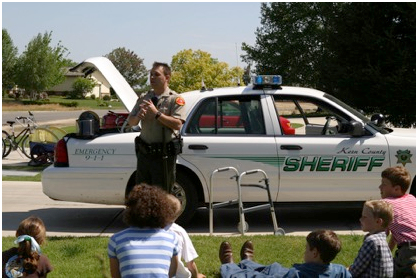 Deputy Sheriff Daniel Lee Archuleta, 35
Deputy Sheriff Daniel Lee Archuleta, 35 Message of the Month –
Message of the Month –
 Crossing the Meurthe River in France – September, 1944
Crossing the Meurthe River in France – September, 1944 “At 0430, 23 September, the bridge was completed. Anti-tank units were the first to cross and the day was spent moving the troops around to further secure the area…
“At 0430, 23 September, the bridge was completed. Anti-tank units were the first to cross and the day was spent moving the troops around to further secure the area… “…the Laws of Nature and of Nature’s God…”
“…the Laws of Nature and of Nature’s God…” “…appealing to the Supreme Judge of the world for the rectitude of our intentions…”
“…appealing to the Supreme Judge of the world for the rectitude of our intentions…” Back the Badge – Psalm 106:3
Back the Badge – Psalm 106:3 Jesus, a much better food connoisseur than the hotel cook, once fed a whole multitude. In John 6:12, we read a startling statement about what happened after dinner—”When they had all had enough to eat, he said to his disciples, ‘Gather the pieces that are left over. Let nothing be wasted.’”
Jesus, a much better food connoisseur than the hotel cook, once fed a whole multitude. In John 6:12, we read a startling statement about what happened after dinner—”When they had all had enough to eat, he said to his disciples, ‘Gather the pieces that are left over. Let nothing be wasted.’” Every
Every [/vc_column_text][/vc_column][/vc_row][vc_row][vc_column][vc_column_text]
[/vc_column_text][/vc_column][/vc_row][vc_row][vc_column][vc_column_text]
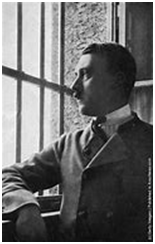 Hitler led 2000 Nazi supporters in an attempt to gain control of Munich. From there they hoped to generate an insurrection in Germany against the Weimar Republic.
Hitler led 2000 Nazi supporters in an attempt to gain control of Munich. From there they hoped to generate an insurrection in Germany against the Weimar Republic.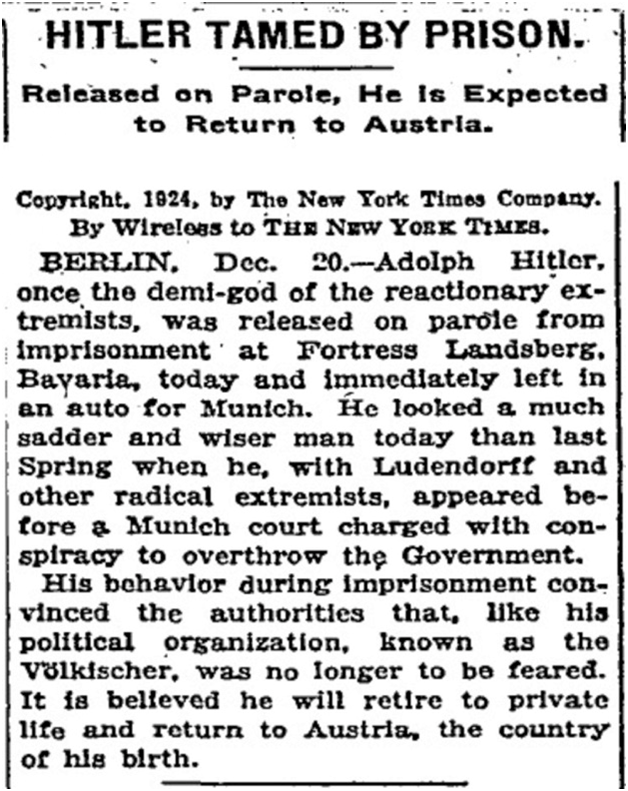
 When severe famine hit the region, Joseph’s brothers had to come to Egypt to buy food. Joseph recognized them and there began the long and necessary process of repentance from sin and reconciliation (Genesis 42-45). And Joseph was also reunited with his father Jacob!
When severe famine hit the region, Joseph’s brothers had to come to Egypt to buy food. Joseph recognized them and there began the long and necessary process of repentance from sin and reconciliation (Genesis 42-45). And Joseph was also reunited with his father Jacob!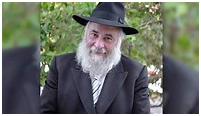 In the United States all religions must be free to worship and exercise their religious convictions in safety. The attack on the Chabad Synagogue in Poway, California is doubly bad. It’s anti-Semitic to the core and it is an attack on everyone’s religious liberty in America. A heroic Jewish woman was killed; Rabbi Yisroel Goldsmith was one of three wounded.[/vc_column_text][/vc_column][/vc_row][vc_row][vc_column][vc_column_text]
In the United States all religions must be free to worship and exercise their religious convictions in safety. The attack on the Chabad Synagogue in Poway, California is doubly bad. It’s anti-Semitic to the core and it is an attack on everyone’s religious liberty in America. A heroic Jewish woman was killed; Rabbi Yisroel Goldsmith was one of three wounded.[/vc_column_text][/vc_column][/vc_row][vc_row][vc_column][vc_column_text]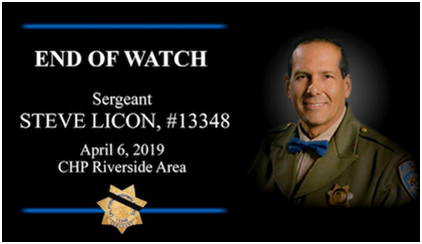 The I-15 corridor near Lake Elsinore, California was a place of outstanding beauty this spring because of the “superbloom” of wild flowers due to abundant rainfall. The cars and crowds that came required extra CHP attention.
The I-15 corridor near Lake Elsinore, California was a place of outstanding beauty this spring because of the “superbloom” of wild flowers due to abundant rainfall. The cars and crowds that came required extra CHP attention. You needn’t be Catholic to feel a big lump of sadness in your throat as you watched the Cathedral of Notre Dame de Paris burn on April 15. The loss of this 850-year-old icon is incalculable, regardless of what remains and things saved by heroic people.
You needn’t be Catholic to feel a big lump of sadness in your throat as you watched the Cathedral of Notre Dame de Paris burn on April 15. The loss of this 850-year-old icon is incalculable, regardless of what remains and things saved by heroic people. 5. Christians should pray for spiritual renewal throughout France and Europe. Perhaps this fire could be a catalyst for needed renewal.
5. Christians should pray for spiritual renewal throughout France and Europe. Perhaps this fire could be a catalyst for needed renewal. A trip to Ohio wasn’t very taxing
A trip to Ohio wasn’t very taxing A Voice of Reason and Wisdom –
A Voice of Reason and Wisdom – A Word Needed Now More Than Ever –
A Word Needed Now More Than Ever – Palm Sunday –
Palm Sunday – Good Friday
Good Friday Throughout the night and into the day Jesus appeared before many religious and secular leaders to be accused, mocked and denounced. He was beaten, scourged and humiliated. Finally, the Roman Governor, Pontius Pilate, acquiesced to the crowd and delivered Jesus to be nailed to a Roman cross—one of the most shameful, hurtful, prolonged forms of capital punishment known to man. (Read Mark 14:43-15:41; John 18:1-19:16)
Throughout the night and into the day Jesus appeared before many religious and secular leaders to be accused, mocked and denounced. He was beaten, scourged and humiliated. Finally, the Roman Governor, Pontius Pilate, acquiesced to the crowd and delivered Jesus to be nailed to a Roman cross—one of the most shameful, hurtful, prolonged forms of capital punishment known to man. (Read Mark 14:43-15:41; John 18:1-19:16) In light of this horror, why call the day “Good Friday”? Because the death of Jesus paid the penalty for the sins of every man and woman who ever lived, and opened the pathway of faith in him, for forgiveness and eternal life.
In light of this horror, why call the day “Good Friday”? Because the death of Jesus paid the penalty for the sins of every man and woman who ever lived, and opened the pathway of faith in him, for forgiveness and eternal life.